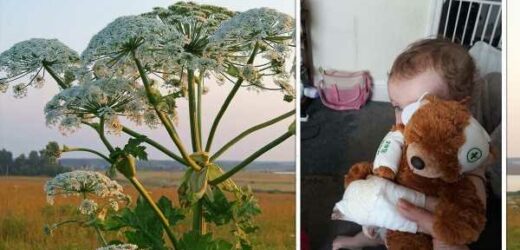Giant hogweed: Plant is a huge hazard to children says gardener
We use your sign-up to provide content in ways you’ve consented to and to improve our understanding of you. This may include adverts from us and 3rd parties based on our understanding. You can unsubscribe at any time. More info
Phillip Ryan, 48, revealed that his daughter Ella’s tiny hands had become covered in giant blisters after coming into contact with the dreaded giant hogweed. Ella, just 22 months old, needed hospital treatment to burst her blisters, remove the dead skin and bandage her hands. It is thought the poor child encountered the awful plant in Burn Valley Park in Hartlepool, County Durham. However, there was no sign of trouble until the next day, when little Ella was with her mother, Suzanne Carlin.
WARNING: This article contains images some may find distressing
Mr Ryan said: “Suzanne thought it was sunburn at first.
“The next day, I brought her home and around lunchtime the first blister came up, and then the second, and then the third, and then the fourth and it just carried on from there.
“I’ve seen sunburn many times and it didn’t look like sunburn. It looked like she’d been scolded. It was horrific.
“I went to pick my son up at quarter past three and by then she was crying with the pain.”


Ella was taken to two different hospitals — North Tees and James Cook — but the medics were mystified by her ailment.
Mr Ryan said: “The day after that she went back and that’s when they treated it, bursting the blisters and taking the skin off and things like that.
“It’s horrific, I’ve never seen a child so badly burned.”
He added that blisters continued to form and grow on poor Ella for days after.


In the end, it was Ms Carlin who identified the likely cause of Ella’s misery — the giant hogweed, Heracleum mantegazzianum.
In 2015, Mersey Basin Rivers Trust senior project manager Mike Duddy said that the giant hogweed was, “without a shadow of a doubt, the most dangerous plant in Britain”.
Able to grow to more than 10 feet tall, this invasive plant sports thick, bristly stems that are often purple-blotched and produces white, upward-facing flowers that are held in flat-topped clusters, like its relative the cow parsley.
The plant is native to Southern Russia and neighbouring Georgia, but was introduced to Britain as an ornamental plant back in 1817 only to end up spreading out of control.
The sap of giant hogweed contains chemicals called furanocoumarins that induce photosensitivity on contact with skin — resulting in gruesome blisters, pigmentation and long-lasting scars when said skin is exposed to light.
The worst part of the plant’s nasty surprise is that only a moment’s contact is enough, meaning that people don’t realise what’s happened until the burns emerge — after which time, the damage is done.
DON’T MISS:
Putin outsmarted: TWO EU nations strike deal to scupper Kremlin’s grip [REPORT]
Spain’s ‘alternative plan’ to cause ‘substantial damage’ to Putin [INSIGHT]
Energy crisis: Sturgeon slapped down over North Sea oil power grab [ANALYSIS]

Mr Ryan said: “Suzanne sent me a link on the internet asking about it and it looked exactly the same as the pictures on the internet. I’m convinced it was giant hogweed.”
The worried father said that he isn’t sure exactly when Ella came into contact with the dangerous plant — but he’s certain of where it must have happened.
He added: “I know it was at Burn Valley. It’s the only place she could have been exposed to it.”
Mr Ryan now hopes to warn other parents about the hazard posed by giant hogweed.
He said: “I haven’t had any experience of it before. I’ve seen plenty of it but I didn’t know what it was and what it could do.
“It’s very important to let people know. I’d hate for someone to go through what we’re going through — she’s in agony with it. It’s horrible for her.
“If you see what’s happened to my daughter, you would let your children nowhere near it.”
According to the Woodland Trust, individuals exposed to giant hogweed sap should thoroughly wash the affected area — and keep it out of sunlight for a few days.
Express.co.uk has approached Hartlepool Borough Council for comment.
Additional reporting by Michael Havis.
Source: Read Full Article


